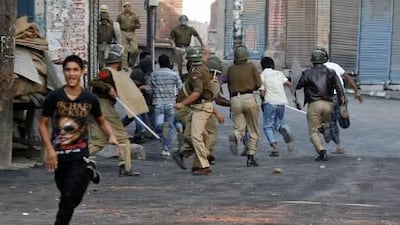SRINAGAR // During the latest unrest in the Kashmir Valley, young protesters began using the internet to organise anti-India rallies and broadcast shocking images of alleged human rights abuses by Indian security forces.
Indian authorities have responded by clamping down on Kashmiris who use social networking sites such as Facebook for political purposes. But analysts warn that such moves could have the opposite of their intended effect, and reignite the violence that has only recently died down.
The internet has given frustrated young Kashmiris a means to vent their anger and its absence could bring them back onto the streets, said Shahid Rasool, the director of the Media Education Research Centre at Kashmir University.
"Humans tend to communicate, and during these hostile conditions the internet has become an important communication medium. If they stop people from using it, they will probably come out on the streets to give vent to their feelings," Mr Rasool said.
Tanzeel Rashid, 19, from Srinagar, who participates in anti-Indian online "protests", said: "We need to express our anger against the killings and oppression. [The] Internet to some extent is the only place where we don't have to face batons and bullets," he wrote during a Facebook chat. "If that too is stopped, in desperation, we will come out on [the] streets."
The continuous curfew and strikes during the past four months have forced Kashmiris to stay indoors, and the internet has become the most reliable and safest medium of communication and coordination.
Indian security agencies have responded to these virtual protests by increasing their monitoring of websites.
Police arrested a 16-year-old Srinigar boy, Faizan Samad, for allegedly posting objectionable notes on his Facebook account last month.
Mufti Wajid Yaqoob, a 26-year-old bank employee, was arrested last week for organising protests through Facebook.
Scores of internet users have been intimidated by security agencies for voicing their political views on the internet and some have even been arrested, according to media reports and accounts of those arrested. Police have issued warnings through the media, cautioning internet users to take necessary care while commenting on social networking sites and blogs. The warnings say there would be consequences if they are not heeded.
"Of course, we will take action against people who will try creating law and order problems," said Ali Mohammed Sagar, Kashmir's law minister.
The popularity of social networking sites such as YouTube and Facebook among Kashmiri youth has increased significantly since massive street protests broke out in June. At least 111 mainly young protesters and bystanders have been killed by police since then.
Before the latest violence, Kashmiris used the internet for mainly mundane purposes, but the unrest has turned the internet into a potent political weapon for the separatists and protesters.
Since then, separatists have used Facebook to release their protest calendars and get feedback from common people in Kashmir. On Saturday, the separatist leader Masarat Alam, who is spearheading the protests, released his third recorded message on YouTube. He asked Kashmiri youth to remain steadfast. Mr Alam went underground soon after protests started in June. So far, police have carried out more than 100 raids in an effort to find him.
Indian security officials say the government was caught off guard by the extensive internet use during the crisis.
"It was something out of the blue; we had no idea that protesters and separatist leaders would use technology and the internet so extensively during the protests. It still remains a challenge for us to handle," said an official, who spoke anonymously because he is not allowed to speak to the media.
While the government was struggling to control the street protests at the height of their ferocity last month, two videos showing apparent abuse by Indian soldiers were posted by an unknown user on Facebook and YouTube.
One of the clips allegedly showed several Indian security officers forcibly parading four naked young Kashmiri detainees through a field, purportedly in Sopore town in Kashmir valley. The security men can be heard mocking the detained youth. The undated video was titled "Kashmir's Abu Ghraib".
The second video showed a semi-naked detainee being beaten by Indian soldiers and a fibre cane forced into his rectum. In the background, policemen are heard hurling abuse.
The videos provoked an outcry from the Kashmiri public and triggered street clashes with Indian security forces.
Police immediately said the clips were staged to discredit the government. A criminal case was filed against Facebook and YouTube for hosting the videos and a search was launched to apprehend the people who uploaded the videos for "defaming" the armed forces. Police also issued warnings through Kashmiri media asking people not to circulate the videos.
Such abuse has been endemic in Kashmir since a popular uprising erupted against Indian rule in the late 1980s. What is new is the widespread dissemination of images and videos of the alleged abuse.
"These cases of sexual harassment have come to the fore innumerable times in the past. It's not a surprise. Such abuse has been a norm for security agencies," said Goutam Navlakha, a civil rights activist based in New Delhi.
"The only surprise is that we can see them on the internet."
Mr Navlakha said the internet is being used as a tool by Kashmiris to "fight back".
Manzoor Ahmad, 28, from Srinagar, spends eight to 10 hours a day on the internet discussing the Kashmir situation with people in Indian cities on Facebook and other sites. He says Indians need to be informed about the oppression in Kashmir and that his online activism will help create pressure on the Indian government to solve the long-standing dispute.
"The Indian media hides the truth from its public and the ordinary people in India are fed with half truths about Kashmir," Mr Ahmad said. "It's our job to inform and tell them the truth, which can help gather support for our movement and stop the military atrocities in Kashmir."

